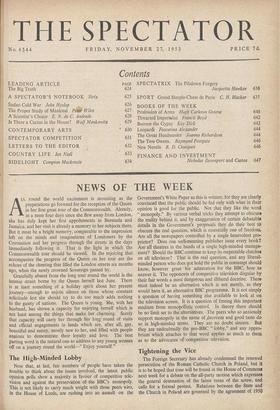The High-Minded Lobby
Now that, at last, fair numbers of people have taken the trouble to think about the issues involved, the latest public opinion polls show a majority in favour of competitive tele- vision and against the preservation of the BBC's monopoly. This is not likely to carry much weight with those peers who, in the House of Lords, are rushing into an assault on the Government's White Paper as this is written; for they are clearly convinced that the public should be fed only with what in their opinion is good for the public. Not that they like the word " monopoly." By various verbal tricks they attempt to obscure the reality behind it, and by exaggeration of certain debatable details in the Government's proposals they do their best to obscure the real question, which is essentially one of freedom. Are all the newspapers controlled by a single benevolent pro- prietor? Does one well-meaning publisher issue every book?, Are all theatres in the hands of a single high-minded manage- ment? Should the BBC continue to keep its respectable clutches on all television? That is the real question, and any liberal- minded person who does not hold the public in contempt should know, however great 'his admiration for the BBC, bow to answer it. The opponents of competitive television disguise by their fair words a most dangerous and illiberal doctrine. There must indeed be an alternative which is not merely, as they would have it, an alternative BBC programme. It is not simply a question of having something else available to look at on the television screen. It is a question of freeing this important medium from monopolistic 'control: In theory there should be no limit set to the alternatives. The peers who so anxiously support monopoly in the name of_clecorum and good taste do so, in high-minded terms. They are no doubt sincere. But they are undoubtedly the pro-BBC " lobby," and any oppro- brium which attaches to that word applies as much to them as to the advocates of competitive television.
































 Previous page
Previous page